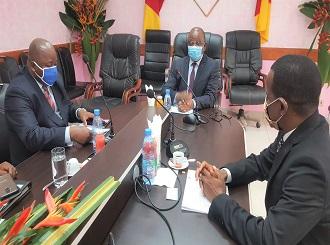
Yaounde, 26 June, 2020 (ECA) – Cameroon’s Minister of Trade – Luc Magloire Mbarga Atangana concurred with officials of the Subregional Office for Central Africa of the UN Economic Commission for Africa (ECA), Thursday evening, that COVID-19 has offered countries of the sub-region the opportunity to re-appropriate the structure of their economies by first ramping up local manufacturing of domestically consumed products and taking advantage of the forthcoming African common market to sell to wider targets.
“We absolutely need to fix the problem of market supply as we use the lessons learnt from COVID-19 to accelerate the implementation of the National Industrial Development Masterplan (PDI, in French) with a focus on agribusiness and the pharmaceutical industry,” said Minister Mbarga Atangana, who literally took the words out the mouth of his guest – Antonio Pedro, Head of ECA’s Central Africa Office.
Mr. Pedro was meeting with the Minister to review Cameroon’s readiness for the African Continental Free Trade Area (AfCFTA) following the formulation of a draft national strategy, supported by ECA.
“Cameroon and other Central African countries combined, import food products worth US$8.5 billion dollars yearly, with equally high figures on the import of pharmaceuticals,” said Mr. Pedro who used the occasion to further insist on the country’s pivotal role in the roll-out of an eventual subregional industrialization and economic diversification masterplan, in the offing.
He said CEMAC and ECCAS member States should capitalize on the masterplan to rake-in benefits from the AfCFTA once it goes operational by January 2021.
“I insist on developing our supply chain but if there is no base market, it would be difficult to sell goods and services profitably,” the minister emphasized.
“ECA is quite ready to use tools such as the Trade Decision Support Model (DSM) and undertake product-space analysis with the view to determining market/export opportunities for Cameroon products as well as evaluating the specific segments of regional and global value chains in which the country would have the highest chances of succeeding,” Mr. Pedro said. These are some of the practical steps in determining where efforts at trade-induced manufacturing, based on Cameroon’s comparative advantages, should be placed,” he added.
Experts of the Ministry of Trade indicated that in addition to such analytical support, Cameroon would require ECA’s technical assistance on many other fronts as it engages in the second phase of AfCFTA negotiations.
These include building the capacity of the national AfCFTA implementation committee being constituted, organizing further stakeholder mobilization fora on the continent’s common market agenda and building a platform for data collection and analysis on non-tariff barriers to free trade in Central Africa.
“It is also time to maximize production in the big and promising sectors of our agriculture including white pepper, honey and cereals and fish products – for which we need special plans,” reasoned Minister Mbarga Atangana.
The issue of positioning Cameroonian products on the Electronic World Trade Platform (eWTP), which facilitates business-to-consumer (B2C) sales, was well explored.
The Minister of Trade was informed that UN Under Secretary-General and Executive Secretary of ECA – Ms Vera Songwe has been canvassing for more African products to get on the platform which was set up by the Alibaba Business Group in 2016 to help small-scale world brands with compelling products reach wider international markets easily. As such, he immediately set his team to working on consolidating a list of Cameroonian products that have the merits to be on the platform.
Messrs Mbarga Atangana and Pedro also agreed that a Made in Central Africa Label, on which ECA’s Office for Central Africa is working to federate efforts from across the subregion, is an important component in the positioning of products from the subregion on both the African and world marketplaces.
The Minister called for more regular encounters with the ECA Office for Central Africa as such discussions offer a unique platform for collective brainstorming on the role of trade in development and how Cameroon can better position itself to make the most of the AfCFTA and other opportunities.
-END-
Media Contact
Abel Akara Ticha - Communication Officer
United Nations Economic Commission for Africa
637, rue 3.069, Quartier du Lac, Yaounde, Cameroon
Tel: +237 222504348
E-mail: akara@un.org